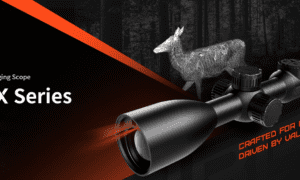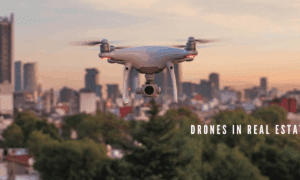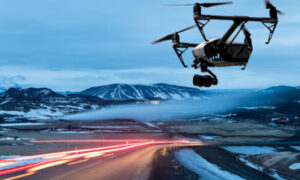Ever wonder if your drone can see in the dark? Or do drones have night vision? You’re not alone. As drones become more popular, more pilots want to know if their aircraft has night vision capabilities.
The short answer is yes, many drones do have night vision options. With the right equipment, you can capture stunning footage after the sun goes down.
In this article, we’ll explore the night vision technologies available for drones and how they work. We’ll discuss options at multiple price points so you can find something that fits your needs and budget.
Whether you’re a hobbyist looking to expand into night flying or a professional drone pilot wanting to offer after-dark services, you’ll learn what it takes to turn night into day for your drone. The world looks different in the dark, and now you can see it from the sky.
How Drones See at Night: Understanding Infrared and Low-Light Cameras
So how do drones see in the dark? They use special cameras that can detect infrared light or capture footage in extremely low-light conditions.
Infrared Cameras
Infrared or IR cameras detect the heat signatures of objects and living things. Everything emits infrared radiation as a result of its temperature, so IR cameras can see shapes and forms even in complete darkness.
Many drones offer IR cameras as an add-on accessory or built-in feature. With an IR camera, your drone can fly at night and capture footage of wildlife, search for lost hikers, or inspect equipment in unlit areas.
Low-Light Cameras
Some drones come equipped with cameras specifically designed for low-light videography and photography. These cameras have image sensors that are extra sensitive to light, as well as wider apertures that let in more light.
They may also have features like night vision modes, slow shutter speeds for light absorption, and ISO settings to brighten footage.
While low-light cameras won’t give you the thermal imaging of an IR camera, they can capture color footage and still photos in situations where normal cameras struggle, like twilight, dusk, and dawn.
If nighttime footage and photos are a priority, look for a drone that advertises a camera with “low-light capabilities” or a high maximum ISO, like 6400 or higher.
With the right equipment, your drone doesn’t have to stop flying after dark. Whether through infrared radiation or light amplification, drones can use built-in cameras to navigate and record footage even when the sun goes down.
Best Drones with Night Vision:
If night flying is in your future, you’ll want a drone with built-in night vision capabilities or the ability to mount an infrared camera. Here are some of the best night vision drones:
DJI Mavic 3 Pro
According to DroneGuider for the ultimate night vision drone, consider the DJI Mavic 3 Classic Pro. It boasts a top-tier 4/3 CMOS Hasselblad Camera, offering unmatched imaging precision for 5.1K HD video and 4K/60fps photos. With up to 46 minutes of flight time, obstacle sensing, and a 15km HD video transmission range, it’s the go-to choice for professionals capturing moments in the dark.
Yuneec Typhoon H
The Typhoon H is equipped with an infrared camera for night flying as well as regular and wide-angle 4K cameras. It offers a “night flight” mode that disables the bright LEDs to avoid blinding the infrared camera.
The retractable landing gear also gives the cameras an unobstructed view. With a max range of 1 mile and 25 minutes of flight time per charge, you’ll have lots of flexibility when the sun goes down.
Autel Robotics EVO II Pro
The EVO II Pro features a 1-inch CMOS sensor and adjustable aperture that provides excellent low light performance for its 4K camera. It also has infrared sensing for obstacle avoidance at night.
A max flight range of 9.3 miles and 40 minutes of flight time mean you can go far and stay out late with this powerful, foldable drone.
For serious nighttime aerial filming and photography, these highly-capable drones can capture stunning footage even after dark and bring an entirely new dimension to your drone adventures. Sweet dreams…and happy night flying!
Tips for Flying Drones at Night Safely and Legally
If you want to fly your drone at night, there are a few important things to keep in mind for safe and legal operation.
Check Local Regulations
Laws regarding nighttime drone flight vary in different areas, so make sure you understand the rules where you plan to fly. Some places prohibit night flying altogether, while others may have additional restrictions like limiting altitude or requiring anti-collision lights. Do your research ahead of time.
Use Proper Lighting
For safety and visibility, equip your drone with bright LED lights, especially if flying at higher altitudes. LEDs are lightweight, energy efficient, and long-lasting.
Place lights on the front, back, and sides of your drone so you can see its orientation from the ground. Consider using colored lights like red and green to help determine which direction it’s facing.
Consider the Environment
Choose an open area away from people, buildings and trees. It’s harder to see potential obstacles in the dark, so start in a wide, unobstructed space until you get comfortable. Grass or dirt is softer than concrete if there’s an accident.
Fly Slowly and Cautiously
Take it slow, especially when first learning to fly at night. Go at a speed that allows you to properly react to your drone’s movements and make smooth corrections. Ascend and descend gradually. Night flying requires a more careful, thoughtful approach.
Have a Spotter
If possible, have someone act as a spotter to help keep an eye on your drone. Two sets of eyes are better than one in low light conditions. Your spotter can also help ensure the drone remains in sight and does not fly outside the bounds of regulations or into unsafe areas.
With the proper precautions taken, flying drones at night can open up exciting opportunities for photos and video.
But safety should always come first, so do your research and start slowly until you get the hang of it. Night flight may seem tricky, but with practice, your skills will grow and your confidence will soar.
Conclusion (Do drones have night vision?)
So there you have it, with the right equipment drones absolutely can have night vision capabilities. Whether you want to scope out the nighttime landscape, do some night photography, or just experience the thrill of flying in the dark, night vision drones open up a whole new world of possibilities for your aerial adventures.
The technology is constantly improving too, with higher resolution cameras, more powerful lighting options and smarter obstacle avoidance systems in the works. Pretty soon, the night may be the best time to take your drone out for a spin.
The future is looking bright, even in the dark. Who knows what other exciting developments are on the horizon for night vision drones. The possibilities seem endless!



































